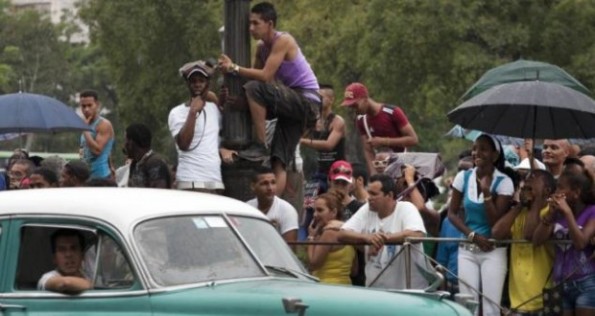 In Cuba people seldom go to extremes. Here you will not find a Mohamed Bouazizi ready to turn himself into a human bonfire in front of the Ministry of Housing to protest excessive taxes.
In Cuba people seldom go to extremes. Here you will not find a Mohamed Bouazizi ready to turn himself into a human bonfire in front of the Ministry of Housing to protest excessive taxes.
There are, however, a lot of Bouazizis around. Their way of rebelling is different. Cubans do not take to the streets to express their discontent. Nor do they organize massive demonstrations with signs or set up protest camps.
They protest at a snail’s pace or with sit-down strikes. Or they steal what they can from their workplaces. Or they behave inappropriately in public or they fail to pay their taxes.
During this month of October the tension within one segment of the population has been palpable. Private taxi drivers are furious. Many have received a notice from the tax office telling them of new levies they must pay.
“I have to pay $15,000 pesos ($740 US). And I know of cases in which taxi drivers have to pay $30,000 pesos ($1,300 US). There is one thing you can be sure of: Just like the rest of them I will not pay one cent,” says one Havana taxi driver, the veins in his neck bulging.
It’s obvious that the regime wants everyone to pay their taxes. They explain that is not an invention by Raul Castro. And like fearful parrots, the official media repeats that “our citizens should learn to have a tax-paying culture, those tax revenues become social benefits”.
The arguments fall on deaf ears. The resentment that prevails among the self-employed workers sees that the States sees them as the enemy.
I’ll give a little bit of history. Throughout the years, the regime harassed the self-employed. One night in 1968 all small businesses were closed. From grocery stores and hamburger vendors to Chinese restaurants and shoe repairers.
When in 1994 Fidel Castro opened the faucet to certain private initiatives he didn’t do it to slowly introduce liberal methods or a market economy. No. It was a matter of political survival.
The public accounts were in red. The State had to deflate if it wanted to be profitable. Then it loosened its grip and permitted minor trades like umbrella repairers, peanut sellers or raw material collectors.
You could also sell coffee, rent a room or set up a restaurant with twelve chairs. Always with the imposing high taxes to slow the capital accumulation.
At the end of 1999 Hugo Chavez came to the Miraflores Palace in Venezuela. A Santa Claus with petro-dollars. Castro took a step back and self-employed work was marginalized. Between 1995 and 2003, the number of self-employed dropped from 170,000 to 150,000.
But in the national landscape there was news. Fidel departed from power in July 2006 due to illness. The natural heir, his brother Raul, is almost the same although with different strategies.
He eliminated absurd prohibitions that classified Cubans as fourth class citizens. He allowed the rent of land, made it legal for Cubans to frequent tourist facilities, and legalized cell phones, the purchase and sell of homes and cars, and as of January, travel abroad.
Currently there are more than 436,000 self-employed workers. According to the government, self-employment “has come to stay”. But ordinary Cubans seem to be distrustful.
Other economic openings were cut off at the root with legal penalties and scorn in the public media. Naturally, people think that the story could repeat itself. Even more when they know that the government allows self-employment as long as they don’t make too much in profits.
Small businesses are controlled by an army of inspectors and harassed by high taxes. Therefore, the escape door of many self-employed workers is tax evasion.
In the island, citizens’ dissatisfaction is not a synonymous of strikes, indignant marches or street protests. The Cuban Bouazizi prefers the passive disobedience, either by stealing at work or not paying taxes.
Ivan Garcia
Photo: Under the rain, people wait in front of the Saratoga Hotel to get a glance of Beyonce and her husband, rapper Jay-Z during their April 2013 visit in Havana to celebrate their fifth wedding anniversary. Taken by NY Daily News.
Translated by LYD
2 November 2013
